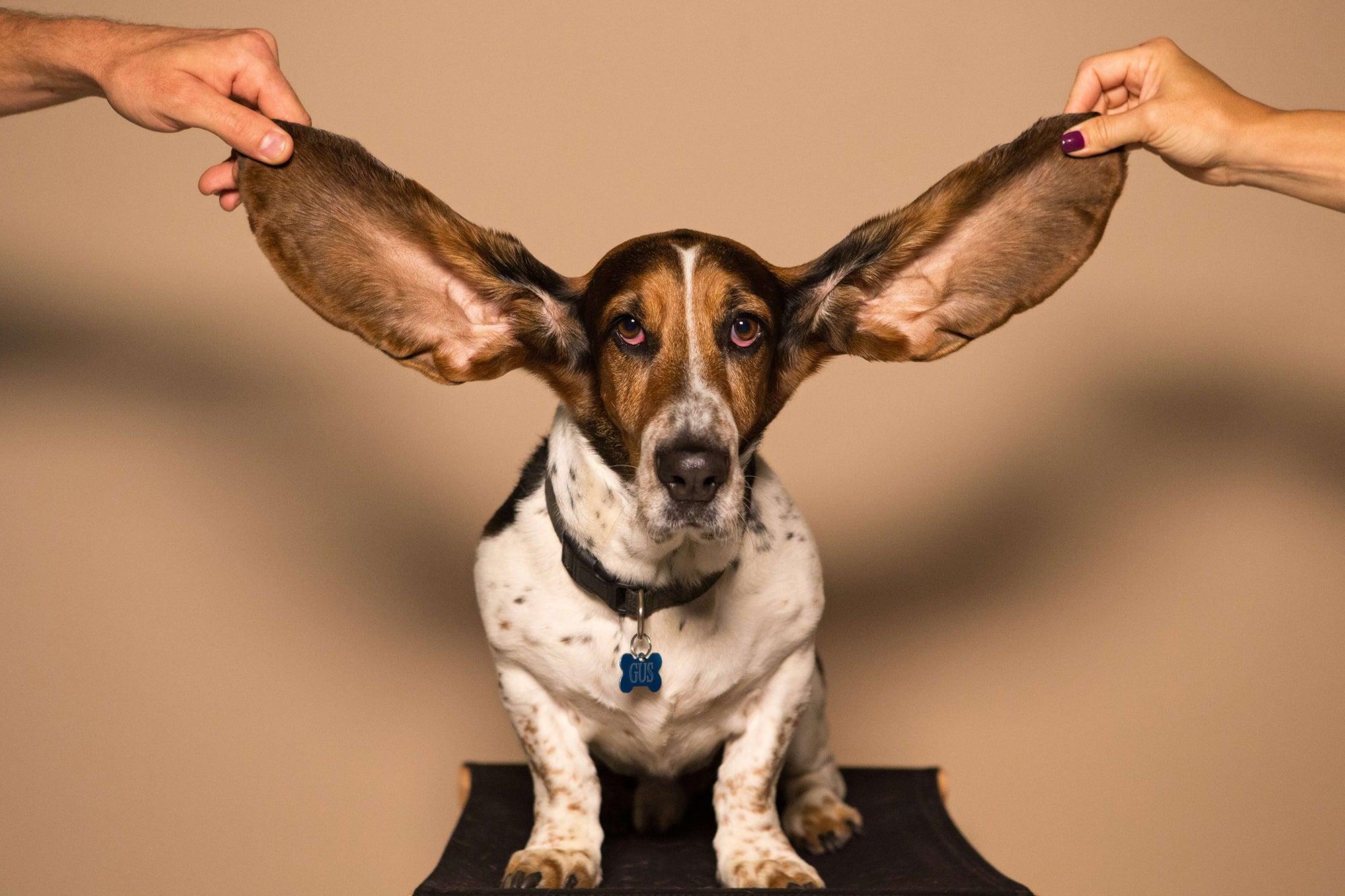“Why do my dog’s ears smell?” Fear not, pet parent. In this blog, we suss out the causes of smelly dog ears, how to help and how to prevent odorous ears from occurring…
- Home/
- Dog/
- Health & Wellness/
- Why Does My Dog Have Smelly Ears?!
Why Does My Dog Have Smelly Ears?!

Dog Ears Smell
If you’ve ever noticed an unpleasant odor emanating from your furry friend’s ears, you’re not alone. In fact, if you notice any smell coming from your pet’s ears, it’s a huge indicator that there could be a serious health problem and may require immediate action on your part. Cheese, vinegar, metal, or honey (sweet) are some of the more common noticeable odors, and they all indicate different issues…
In this article, we will take a look at the five most common reasons why your dog may have smelly ears and provide practical tips on how to treat and prevent this unpleasant issue. Join me as we sniff out the facts together!
Key facts:
- Unpleasant odors from a dog’s ears are a significant sign of potential health issues.
- Common odors include cheese, vinegar, metal, or honey, each indicating different health concerns.
- Excessive earwax buildup can disrupt the ear’s self-cleaning ability.
- Allergies, both environmental and dietary, can cause ear infections due to the overgrowth of bacteria and yeast, resulting in a sweet or rancid odor.
- Grass seeds in the ear are a common issue, especially in the summer.
- The shape of a dog’s ear or their breed can predispose them to infections due to trapped moisture, with floppy-eared dogs being more susceptible.
What Causes Smelly Dog Ears?
Smelly ears in dogs are most commonly the result of an infection or inflammation. If any part of the ear or ear canal becomes infected, inflamed, or affected by underlying diseases (such as allergies or hormonal diseases), it can lead to foul smells! Inflammation or infection of the external ear canals is known as otitis externa.
Let’s take a look at some of the main causes of otitis externa and smelly dog ears…
My Dog’s Ears Smell Bad
It Could Be Wax Buildup
Earwax plays an extremely important part when it comes to the health of your pup’s ears. Wax is naturally developed by the body to moisturize the skin around the ear canal, preventing discomfort and irritation from itchy, dry ears. In addition, the chemicals found in this soft substance can fight off harmful pathogens and infections.
Acting like a protective shield for the eardrum, this light-brown wax can sometimes become excessive and accumulate within the ear canal if the self-cleaning ability of your dog’s ear becomes disrupted. This is when changes in color and volume of the earwax may occur, becoming yellow or reddish-brown, and weeping out of the ear. If the imbalance is not corrected, this excess wax can predispose the ears to become infected, resulting in foul odors.
It Could Be A Bacterial Infection
Bacterial infections often involve more than one type of bacteria, and normally cause a sweet-honey or rotten meat smell to emanate from the ear. Typically accompanied by swelling, redness, itching, and sometimes pain, bacterial infections generally need medical attention as soon as possible – requiring treatment with antibiotic ear drops.

If you notice a horrid smell along with excess discharge and clinical signs of an ear infection (e.g. headshaking, circling, scratching, rubbing their ears on the floor, or a reluctance to have their ears touched due to significant pain and inflammation), visit your veterinarian as soon as possible.
Dr. Jennifer Rowan-Hitchcock, DVM
It Could Be A Yeast Infection
Malassezia pachydermatis is a yeast organism that is normally present in small numbers on the skin and in the ear canals of our furry friends. The key to healthy yeast is balance, but when the immune system falters due to stress or illness, yeast can grow out of control, causing numerous clinical signs of skin disease, including:
- Itchiness
- Discomfort
- Swelling
- Redness
- Dry skin
Before you start to panic, yeast infections are not fatal, but they can lead to other health issues and complications that require your immediate attention.
Symptoms of a yeast ear infection include:
- Scratching and rubbing the ears
- Head shaking
- Foul odor
- Walking in circles or loss of balance
- Crusty skin around the ear
- Hearing loss
- Browny/yellow discharge
- Blood
If you believe your pooch has a yeast infection in their ear, please visit your veterinarian as soon as possible so that they can diagnose the problem and help your furry friend get back to full,non-smelly ear health.

It Could Be Allergies
Another common cause for foul-smelling dog ears is an allergy – either environmental or dietary. Almost half of the canine ear infections are caused by an allergic reaction that results in the overgrowth of bacteria and yeast that are normally present in small numbers within the normal ear canal. For both of these potentially harmful pathogens to overgrow, they need the optimum environment… and an allergic reaction is perfect for providing this.
When allergens trigger your pup’s immune system, the immune mediators within the body will try to fight off the offending pathogen. This natural reaction can lead to excess moisture and swelling within the ear canal, where yeast and bacteria thrive, resulting in colonization and infection, along with a sweet or rancid odor.
Ear infections commonly go hand-in-hand with skin allergies, as the ears are an extension of the skin. About 50% of dogs with allergic dermatitis also suffer from recurring ear disease, and 80% of dogs that have food sensitivities do too. Allergies predispose dogs to very severe ear infections, so this may be something to consider in the long term to get your pup’s issues under control.
The most noticeable signs your pup is suffering from allergies that may also be causing further pathology within the ears include:
- Warm, red skin
- Discharge from the ear
- Open scabs and sores in or around the ears
- Head rubbing on the side of the affected ear
- Scratching ear(s)
- Swollen inner ear canal
If you believe your pup is suffering from allergies that are also affecting the ear, please visit your veterinarian as soon as possible so that they can help identify the offending allergen and eliminate it from your pup’s environment or avoid it altogether. They’ll also be able to administer any necessary medications and ointments to clear the infection and reduce the swelling within the affected ear canal.
It Could Be Grass Seeds
If your dog has a gunky, smelly ear and a sudden onset of violent head shaking, this may indicate they have a grass seed in the ear canal! Grass seeds (or grass awns) are notorious for getting into places they shouldn’t and are a common problem, especially in the summer months. They are most commonly found inside the ear, the eye, in between the toes, and in the skin. Because of their one-directional, dart-like shape, they are sharp enough to penetrate the skin or a crevice, but they cannot come out themselves and instead keep migrating forward. This can cause swelling, abscesses, and infections if not found and removed early!
If an ear infection is suspected and your pup is scratching at its ears and even circling to one side, it is important to go to the veterinarian so they can have a look in the ear canal to see if there is a pesky grass seed stuck inside. These often need to be removed by the veterinarian, as well as giving your pup the necessary medication to reduce swelling and clear the secondary infection.

Ensure you don’t ignore the signs because grass seeds can become VERY painful for your dog, and may damage the internal structures (such as the eardrum), leading to serious problems further down the line.
Dr. Jennifer Rowan-Hitchcock, DVM
It Could Be Due To The Shape Of Their Ear Or Their Breed
Your dog’s ear canal is shaped similarly to the letter ‘L’. No matter what breed, all canine ear canals will have this general shape. However, due to this particular design, there are areas of the ear canal that, deep within, are the perfect environment for fungus and bacteria to grow.
If your pooch loves to swim in the lake when you’re out for a walk, or you might have accidentally sprayed water into their ear while bathing them, this excess water can easily get trapped in the dark, deep area of the ‘L’-shaped canal, creating the perfect environment for bacteria to colonize and cause an infection (otitis externa), leading to foul-smelling ears and other symptoms typically associated with ear infections.
In addition, dogs with floppy ears, such as Beagles, Basset hounds, English cocker spaniels, and Cavalier King Charles spaniels, are more susceptible to ear infections as their pendulous ears restrict airflow and moisture is trapped easily within the canal.

How To Treat & Prevent Smelly Dog Ears
As you can see from above, many different causes of smelly dog ears exist. From sweet to putrid, any pungent smell emanating from your pup’s ears is a cause for concern. Seeking medical advice is paramount to help your pet resolve the issue, as a neglected ear infection could lead to hearing loss.
However, there are things you can do at home to help your pet’s ear health, but we do recommend you talk to your veterinarian before you start putting anything inside your fur baby’s ear!
Probiotics
A great way to help your pet fight the cause of smelly ears is by simply adding probiotics to their diet. Packed with beneficial nutrients and bacteria that are naturally found in the gut, adding a probiotic to your pet’s meal can significantly improve their overall health and give their natural defenses the tools to combat infection while keeping healthy bacteria balanced.
When your dog’s gut is in perfect working condition, their entire body will function better, which is why probiotics are so important and an integral supplement to add to your pet’s daily routine.
Diet
A balanced diet plays an essential role in maintaining your pup’s ear health – and keeping the bad smells at bay! Dogs are omnivores, meaning they should not survive on meat alone and require a combination of meat, vegetables, and carbohydrates to have a nutritious diet and obtain all the vitamins they need. But, if they are fed a poor-quality diet or are fed large numbers of sugary treats, this creates an environment where “bad” bacteria thrive and multiply, leading to bacterial imbalances and recurring infections.
That being said, if your pup has recurrent ear infections or certain sensitivities, you can purchase a ‘Sensitive Skin & Stomach’ diet, for example, from many reputable companies, which only use high-quality ingredients and protein sources. These diets have been proven to support your dog’s overall skin health and promote the protective skin barrier function from potential “invading” allergens. They often contain high levels of Omega-3 and Omega-6 fatty acids to strengthen the skin barrier and break the cycle of inflammation. They also typically contain vitamin E, which is an antioxidant. This vitamin helps neutralize toxic free radicals in the skin. These diets are great for dogs with chronic skin and ear conditions, so it’s worth looking into.
You can contact the company’s advisory team or your veterinarian if you have any specific questions about a specific type of food and the alternative protein sources they have available. If your dog has a specific meat or grain allergy and you need recommendations for an alternative source of protein or carbohydrates, consult with your veterinarian.
Final Thoughts
If you notice any kind of foul odor coming from your dog’s ears, it is usually a sign that something is wrong with the ear and will require your attention as soon as possible. An examination by a veterinarian is recommended to obtain a proper diagnosis and initiate the most effective treatment plan. However, by adding a probiotic to their daily routine and making sure you’re feeding them a balanced, high-quality diet, you should be able to help your furry friend combat any potential infections or irritants that can cause smelly ears!
FAQs
What causes my dog’s ears to smell bad?
Bad smells from your dog’s ears are typically caused by infections or inflammations, such as otitis externa. Common reasons include excessive earwax buildup, bacterial infections, yeast infections, allergies, grass seeds getting stuck, and the natural shape of your dog’s ear or breed predispositions.
Are certain dog breeds more susceptible to smelly ears?
Yes, dogs with floppy ears, like Beagles, Basset Hounds, English Cocker Spaniels, and Cavalier King Charles Spaniels, are more prone to smelly ears and ear infections because their ear shape restricts airflow and traps moisture.
What should I do if I notice a bad smell coming from my dog’s ears?
If you detect a foul odor from your dog’s ears, it’s important to consult a veterinarian as soon as possible for an examination and appropriate treatment.
Can diet affect my dog’s ear health?
Absolutely. A balanced diet is crucial for maintaining your dog’s ear health. Poor-quality diets or excessive sugary treats can lead to bacterial imbalances and infections. Specially formulated diets for sensitive skin and stomach can help support overall skin health and reduce the risk of ear infections.
How often should I clean my dog’s ears?
The frequency of ear cleaning depends on your dog’s breed, activity level, and health needs. Consult with your veterinarian for a recommended cleaning schedule tailored to your dog.
Sources:
https://www.petmd.com/dog/general-health/why-do-my-dogs-ears-smell-bad
 B
B




